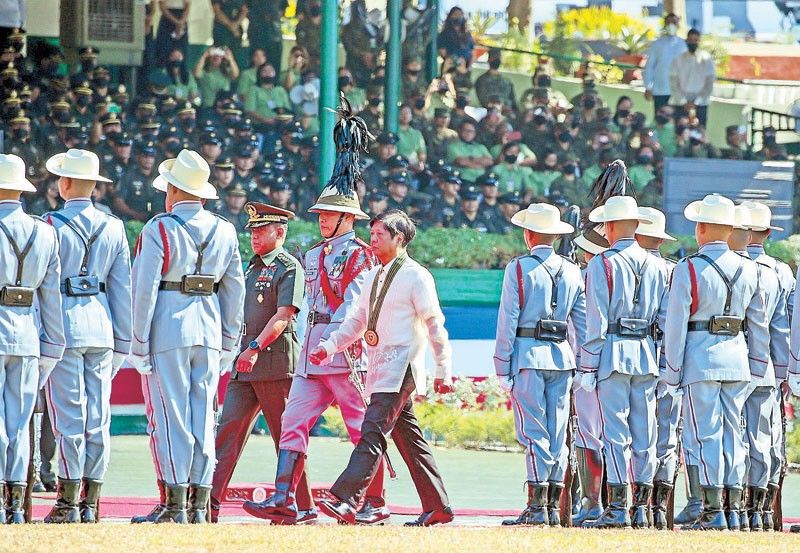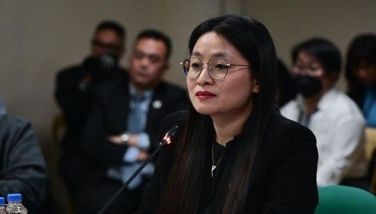Marcos: LGUs understand importance of EDCA sites

MANILA, Philippines — Local government units (LGUs) understand the importance of the Enhanced Defense Cooperation Agreement (EDCA) sites in their jurisdictions, President Marcos said yesterday.
Four new sites that will be included in the EDCA between the Philippines and the US are “scattered” around the country, Marcos said, refusing to give specifics, but the additional locations are in Palawan and in the northern and southern parts of the country.
In an interview in Taguig City, the President said the goal is to defend the country’s eastern coast, noting that the Philippines’ continental shelf on Luzon’s eastern side was also taken into consideration.
When asked whether he reached out to officials of LGUs opposing having the EDCA sites in their localities, the President said he talked to them and explained the importance of these sites in their jurisdictions.
“Yes, we explained to them why it was important that we have that and why it will actually be good for their province,” Marcos said.
“And they seem to understand because most of those who had interposed some objections are really right now, they understood and have come around to support the idea of an EDCA site in their province,” he said.
“We’ll make a formal announcement. But yes, they have been identified and we can already – before I announce it, we will formalize it with our partners in the United States so that it will be done simultaneously, we will not preempt their plan,” Marcos said.
“So there are four extra sites scattered around the Philippines. There are some in the north, there are some around Palawan, there are some further south,” the President said.
The President granted last month US troops access to four more Philippine military camps, on top of the five existing locations under the EDCA.
The agreement to have four additional sites was made formal during the visit of US Defense Secretary Lloyd Austin III to the country on Feb. 2.
The US Department of Defense had said the addition of new EDCA locations would allow more rapid support for humanitarian and climate-related disaster response in the Philippines, as well as other shared challenges.
Marcos earlier said he does not want the new EDCA sites to cause tension in the South China Sea.
The US has allocated over $82 million toward infrastructure investments at the five existing sites under the EDCA – Basa Air Base in Pampanga, Fort Magsaysay in Nueva Ecija, Lumbia Air Base in Cagayan de Oro City, Antonio Bautista Air Base in Palawan and Mactan-Benito Ebuen Air Base in Cebu.
Filipino and American troops are scheduled to hold their largest-ever military exercise next month.
The Pentagon announced that the US and the Philippines have agreed to review the full range of their maritime cooperation during the 2+2 meeting in Washington in April.
Earlier, the governor of Cagayan refuted claims by Department of National Defense officer-in-charge Carlito Galvez that he is open to the proposal to build an EDCA facility in his province.
Gov. Manuel Mamba made it clear that he will continue to oppose the presence of foreign forces in the northern province.
In an interview on One News’ “The Chiefs” on Tuesday, Mamba said that the EDCA is the call of the President, but that he will continue to oppose any related efforts in Cagayan.
“Specific ang sinabi ko. Ayoko ng foreign forces in my province. I don’t want EDCA sites in my province,” he said in the interview. “I’ll continue opposing it and telling my people the effects of this because it would be magnet of attacks from the adversaries of the US.”
Mamba underscored the province’s connection to northern foreign countries, particularly China which he said is a big market for their agricultural products.
Modernization
Speaking at the Philippine Army’s 126th founding anniversary celebration at Fort Bonifacio in Taguig City yesterday, Marcos stressed the importance of upgrading the country’s defense capability, noting that technological advancements will dictate the future of warfare.
“We will continue to invest not only in modern equipment and materiel but also in your training, so you can keep abreast of concepts, doctrines and strategies that we now need in the modern battlefield,” the commander-in-chief said.
“The army must always be fully prepared and capable for any contingencies, especially considering you are the country’s last line of defense against any external security threat,” he said.
The President also reminded the army to continue improving its relations with counterparts overseas through sharing of information and learning from the best regional practices to make the Philippine military better.
He also urged the army to remain vigilant, considering a more complex and unpredictable external security environment.
“Be vigilant against elements that will undermine our hard-earned peace, our hard-earned stability,” he said.
As the country’s half-a-century’s fight with communist insurgents is coming to an end, the President said there is a need for a recalibration of the AFP’s military doctrine in dealing with internal security threats.
He also urged the military to continue being the catalyst for the rebels’ surrender and disarmament.
“Take on the task of peacemakers – work with the national government agencies, the civil society groups, the private sector and the communities themselves in keeping the peace,” he said.
“It is a critical task as it is only through achieving internal security that we will be able to foster development and address equally important security concerns. It now behooves upon you to ensure that these areas will not fall onto the hands of those who intend to sow fear, discontent and terror,” the President said.
Meanwhile, from often used phrase “rock solid” and “ironclad,” the United States describes its support for the Philippines as “unwavering alliance commitment.”
Pentagon Press Secretary Brig. Gen. Pat Ryder said the phone call of Austin with Galvez on Monday was an opportunity to again reaffirm the US’s unwavering alliance with the Philippines.
The US, he said, “very much appreciates the relationship that we have with our Philippine allies.”–Romina Cabrera, Pia Lee-Brago
- Latest
- Trending





























